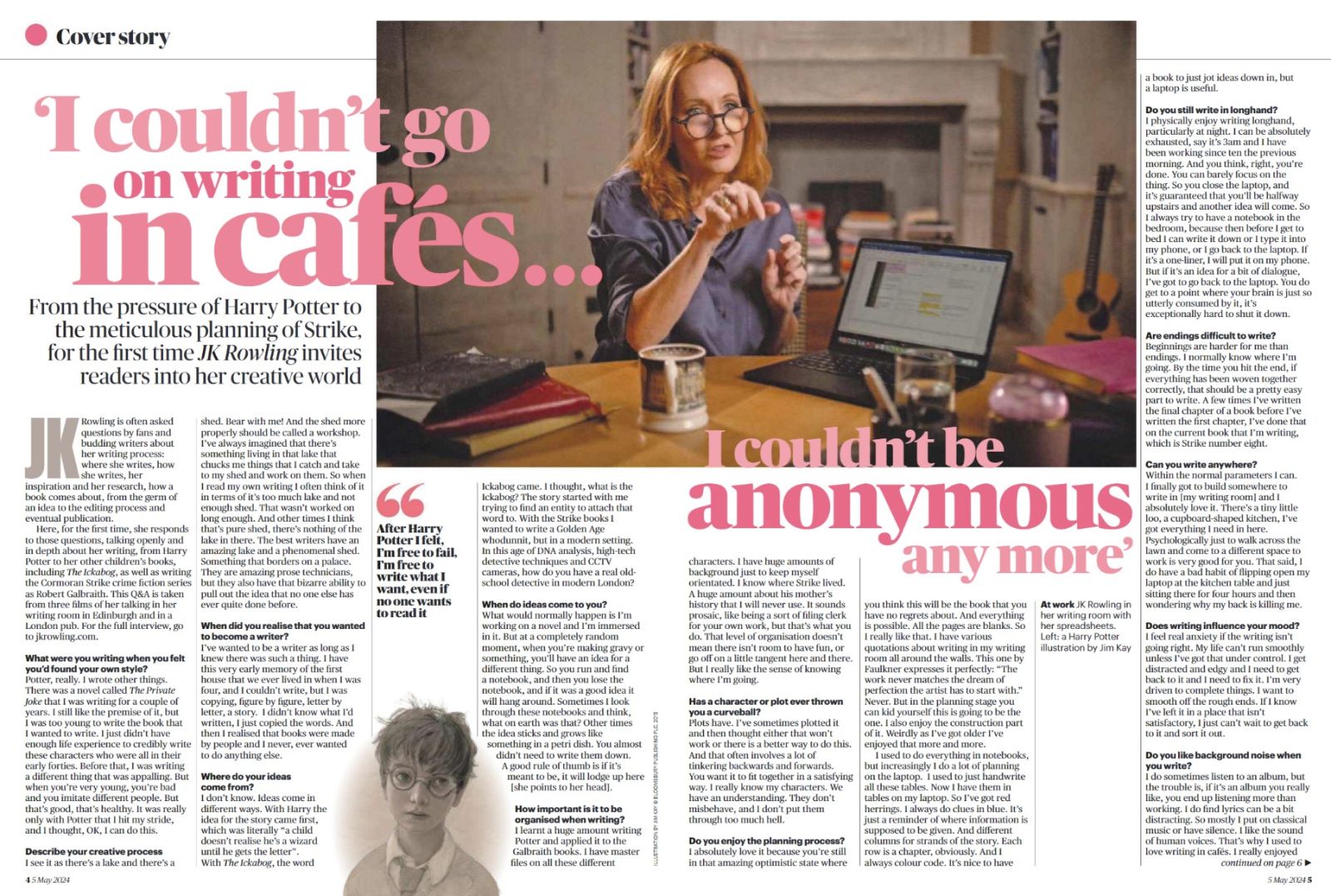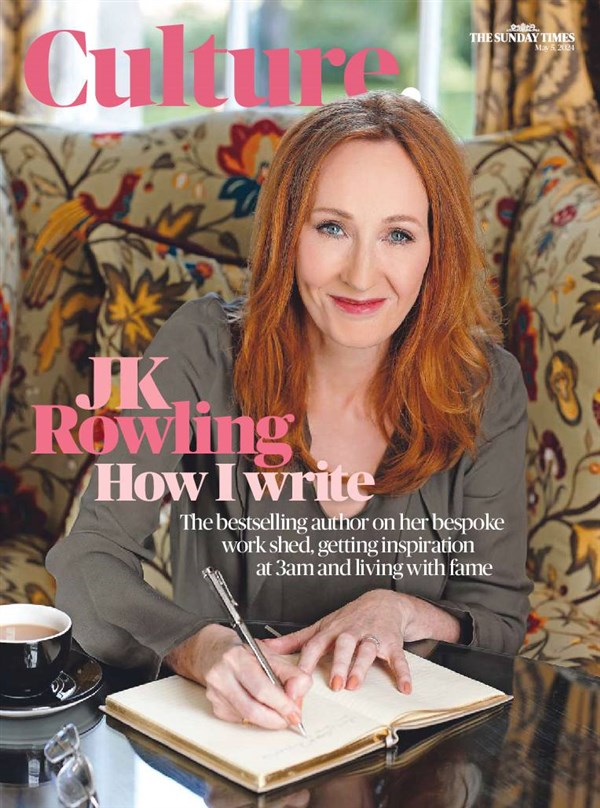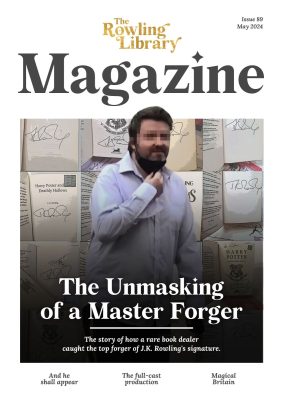Today, May 5th, The Sunday Times has published an extensive interview with J.K. Rowling about her writing process. The interview, according to the newspaper, was recorded in three parts, in her writing room in Edinburgh and in a pub in the city of London. The videos will apparently be released on J.K. Rowling’s website tomorrow, Monday, May 6th, although it is unclear whether there will be more material or if what The Sunday Times has shown in its Culture supplement is all there is (personally, I would say there must be more material than just these questions if three videos have been recorded).

What were you writing when you felt you’d found your own style?
Potter, really. I wrote other things. There was a novel called The Private Joke that I was writing for a couple of years. I still like the premise of it , but I was too young to write the book that I wanted to write. I just didn’t have enough life experience to credibly write these characters who were all in their early forties. Before that, I was writing a different thing that was appalling. But when you’re very young, you’re bad and you imitate different people. But that’s good, that’s healthy. It was really only with Potter that I hit my stride, and I thought, OK, I can do this.
Describe your creative process
I see it as there’s a lake and there’s a shed. Bear with me! And the shed more properly should be called a workshop. I’ve always imagined that there’s something living in that lake that chucks me things that I catch and take to my shed and work on them. So when I read my own writing I often think of it in terms of it’s too much lake and not enough shed. That wasn’t worked on long enough. And other times I think that’s pure shed, there’s nothing of the lake in there. The best writers have an amazing lake and a phenomenal shed. Something that borders on a palace. They are amazing prose technicians, but they also have that bizarre ability to pull out the idea that no one else has ever quite done before.
When did you realise that you wanted to become a writer?
I’ve wanted to be a writer as long as I knew there was such a thing. I have this very early memory of the first house that we ever lived when I was four, and I couldn’t write, but I was copying, figure by figure, letter by letter, a story. I didn’t know what I’d written, I just copied the words. And then I realised that books were made by people and I never, ever wanted to do anything else.
Where do your ideas come from?
I don’t know. Ideas come in different ways. With Harry the idea for the story came first, which was literally “a child doesn’t realise he’s a wizard until he gets the letter”. With The Ickabog, the word Ickabog came. I thought, what is the Ickabog? The story started with me trying to find an entity to attach that word to. With the Strike books I wanted to write a Golden Age whodunnit, but in a modern setting. In this age of DNA analysis, high-tech detective techniques and CCTV cameras, how do you have a real old-school detective in modern London?
When do ideas come to you?
What would normally happen is I’m working on a novel and I’m immersed in it. But at a completely random moment, when you’re making gravy or something, you’ll have an idea for a different thing. So you run and find a notebook, and then you lose the notebook, and if it was a good idea, it will hang around. Sometimes I look through these notebooks and think, what on earth was that? Other times the idea sticks and grows like something in a petri dish. You almost didn’t need to write them down. A good rule of thumb is if it’s meant to be, it will lodge up here [she points to her head].
How important is it to be organised when writing?
I learnt a huge amount writing Potter and applied it to the Galbraith books. I have master files on all these different characters. I have huge amounts of background just to keep myself orientated. I know where Strike lived. A huge amount about his mother’s history that I will never use. It sounds prosaic, like being a sort of filing clerk for your own work, but that’s what you do. That level of organisation doesn’t mean there isn’t room to have fun, or go off on a little tangent here and there. But I really like the sense of knowing where I’m going.
Has a character or plot ever thrown you a curveball?
Plots have. I’ve sometimes plotted it and then thought either that won’t work or there is a better way to do this. And that often involves a lot of tinkering backwards and forwards. You want it to fit together in a satisfying way. I really know my characters. We have an understanding. They don’t misbehave, and I don’t put them through too much hell.
Do you enjoy the planning process?
I absolutely love it because you’re still in that amazing optimistic state where you think this will be the book that you have no regrets about. And everything is possible. All the pages are blanks. So I really like that. I have various quotations about writing in my writing room all around the walls. This one by Faulkner expresses it perfectly: “The work never matches the dream of perfection the artist has to start with.” Never. But in the planning stage, you can kid yourself, this is going to be the one. I also enjoy the construction part of it. Weirdly as I’ve got older I’ve enjoyed that more and more.
I used to do everything in notebooks, but increasingly I do a lot of planning on the laptop. I used to just handwrite all these tables. Now I have them in tables on my laptop. So I’ve got red herrings. I always do clues in blue. It’s just a reminder of where information is supposed to be given. And different columns for strands of the story. Each row is a chapter, obviously. And I always colour code. It’s nice to have a book to just jot ideas down in, but a laptop is useful.
Do you still write in longhand?
I physically enjoy writing longhand, particularly at night. I can be absolutely exhausted, say it’s 3am and I have been working since ten the previous morning. And you think, right, you’re done. You can barely focus on the thing. So you close the laptop, and it’s guaranteed that you’ll be halfway upstairs and another idea will come. So I always try to have a notebook in the bedroom, because then before I get to bed, I can write it down or I type it into my phone, or I go back to the laptop. If it’s a one-liner, I will put it on my phone. But if it’s an idea for a bit of dialogue, I’ve got to go back to the laptop. You do get to a point where your brain is just so utterly consumed by it, it’s exceptionally hard to shut it down.
Are endings difficult to write?
Beginnings are harder for me than endings. I normally know where I’m going. By the time you hit the end, if everything has been woven together correctly, that should be a pretty easy part to write. A few times I’ve written the final chapter of a book before I’ve written the first chapter, I’ve done that on the current book that I’m writing, which is Strike number eight.
Can you write anywhere?
Within the normal parameters I can. I finally got to build somewhere to write in [my writing room] and I absolutely love it. There is a tiny little loo, a cupboard-shaped kitchen, I’ve got everything I need in here. Psychologically just to walk across the lawn and come to a different space to work is very good for you. That said, I do have a bad habit of flipping open my laptop at the kitchen table and just sitting there for four hours and then wondering why my back is killing me.
Does writing influence your mood?
I feel real anxiety if the writing isn’t going right. My life can’t run smoothly unless I’ve got that under control. I get distracted and edgy and I need to get back to it and I need to fix it. I’m very driven to complete things. I want to smooth off the rough ends. If I know I’ve left it in a place that isn’t satisfactory, I just can’t wait to get back to it and sort it out.
Do you like background noise when you write?
I do sometimes listen to an album, but the trouble is, if it’s an album you really like, you end up listening more than working. I do find lyrics can be a bit distracting. So mostly I put on classical music or have silence. I like the sound of human voices. That’s why I used to love writing in cafés. I really enjoyed being sort of alone, but amongst people. That background hum of conversation I found very soothing. But there came a point where I couldn’t go on writing in cafés any more. Which is a real shame, but I couldn’t be anonymous any more.
Do you snack while you write?
That’s why my laptop’s always so filthy. Popcorn is great to eat while you’re writing because it’s dry if you drop it on the keyboard. I’m giving the entirely correct impression I’m quite sloppy.
Is writing getting easier?
I’ve only ever once in my whole professional life had writer’s block. That was in the second Harry Potter book, and I absolutely froze because the first book had overshot my wildest expectations, and I was in a state of panic. It only lasted about a week, but I just couldn’t see my way forward. I was just so overwhelmed. Since then, I’ve had days where I think, well, that’s a load of garbage. But it’s always useful because sometimes you need to write it out to see that it’s garbage. You’ve got to try and you’ve got to fail, I think. As the years roll by, you become more confident that we’ll find a way through this. I now have a lot of faith in that at 2am that creature will chuck me something and I’ll catch it, and I’ll take it to the workshop and we’ll be good.
Does writing remain with you when you leave the writing room?
Yes, and I excuse my general air-headedness with my family. I sometimes forget what month I’m in because, for example, on the [Strike] book I’m writing now, I’m in January 2017. And because I’m thinking about those dates so much, I leave my writing room at the end of the day and my husband’s talking to me about something next week, but I’m mentally on a damp Tuesday six years ago. So you become phenomenally engrossed in it, and it becomes phenomenally real to you.
How did the ending of the Potter books affect you?
I lived a huge amount of my life in that world in a way that no one else possibly can. Some of those 17 years had been quite traumatic for me, and this was a place I was escaping into. So the idea that I would never be able to escape there again was a bereavement. That said, to be very honest, I was on a certain level relieved it was over. I‘d done what I set out to do, and the Potter phenomenon had become something that no one could have predicted. It sounds bizarre, but [after Potter] I felt, I’m free to fail, I’m free to write what I want to do, (even) if no one wants to read it. It is not advantageous to a writer to become very famous. There are writers who enjoy fame, and there are writers who make an accommodation with fame, and that would be me. I would be the first to say there are very nice aspects to it. People walking up to you in the street and saying, you wrote my favourite book. That is a beautiful thing to hear.
But that said, it was a bereavement. I know I’m going to feel exactly the same way when I finish the Galbraith books. That’s going to be hard for different reasons because it’s been pure joy from start to finish.
What is the hardest part about being a writer?
I don’t think that I’ve ever found being a writer difficult, ever. That’s not to say that writing isn’t difficult, and it’s not to say I don’t think I could improve. What I have found difficult are things that came about as an offshoot of my writing. The truth is my wild fantasy would be that I would hand over a credit card in a shop and someone would look at the name on the card and say, you wrote my favourite book. That was the cap on my real-world ambition. What happened took a lot of dealing with. But that’s not about the writing, that’s about being a famous person. But I feel I have made an accommodation with it. This is not a sob story. I’m not asking for pity. I’m just being very honest about the difficulty for me has never been the writing.
Where do you get inspiration for characters’ names?
I’ve now created so many characters, it’s a nightmare because every time I think of a surname, I’ve used it before. So I have baby name books and surname books, and I’ll open them at random and try to fit names together. You’ve got to be careful because if you use a surname and then you remember you were at school with someone when you were 12 who had that surname, is that person going to feel offended? It’s tricky.
Has an actor ever influenced your writing?
An actor has never given me an idea for anything, but I’ve had two situations where I have had a meaningful talk with actors about character. One was with Alan Rickman. He rang me up and said, “Look, I’m spinning plates here. I really need to understand what Snape’s up to? Am I a pure baddie?” He was the only person I told: “You were in love with Harry’s mother.” I talked him through it: “You are a double agent. But you do dislike Harry. You can’t overcome your quite visceral dislike of this boy who looks just like your arch enemy.” So I told Alan Rickman what was coming, way before it came in the movies.
How hard is it to kill off characters?
I don’t like killing off characters, but it’s part of life, isn’t it? Killing Snape was awful. I always knew he was going to go. I couldn’t bear killing Lupin and Tonks [Harry’s teacher and his wife], that was so sad. Oh and Fred [Weasley]. I’ve now killed off a pretty major character in the Strike books which, again, I knew from the start was going to happen. The question was when? I thought it might be in book eight, but I decided seven was the right time.
Do you have more books in the pipeline?
I’ve got six books in my head. I’ve got the one I’m currently writing. There’ll be two more Strikes, and then there are three more books that I really want to get to. [She taps her head] I always gesture to the back of my head. I’m sure an MRI scan would prove it’s got nothing to do with the back of my brain, but I always find myself doing this when I’m talking about where it comes from. God knows. But I do have other stories in my head that I really need to get out.



